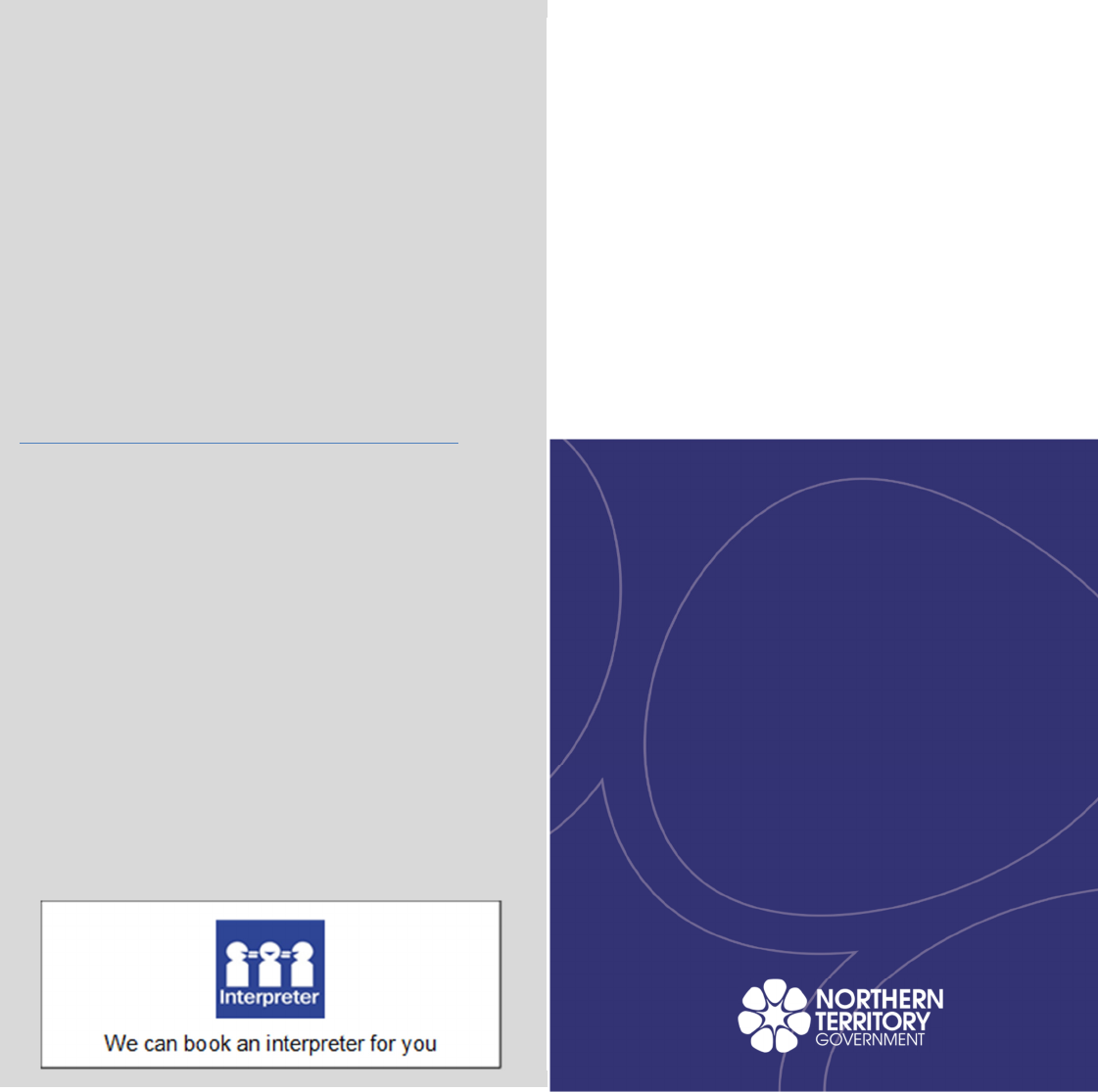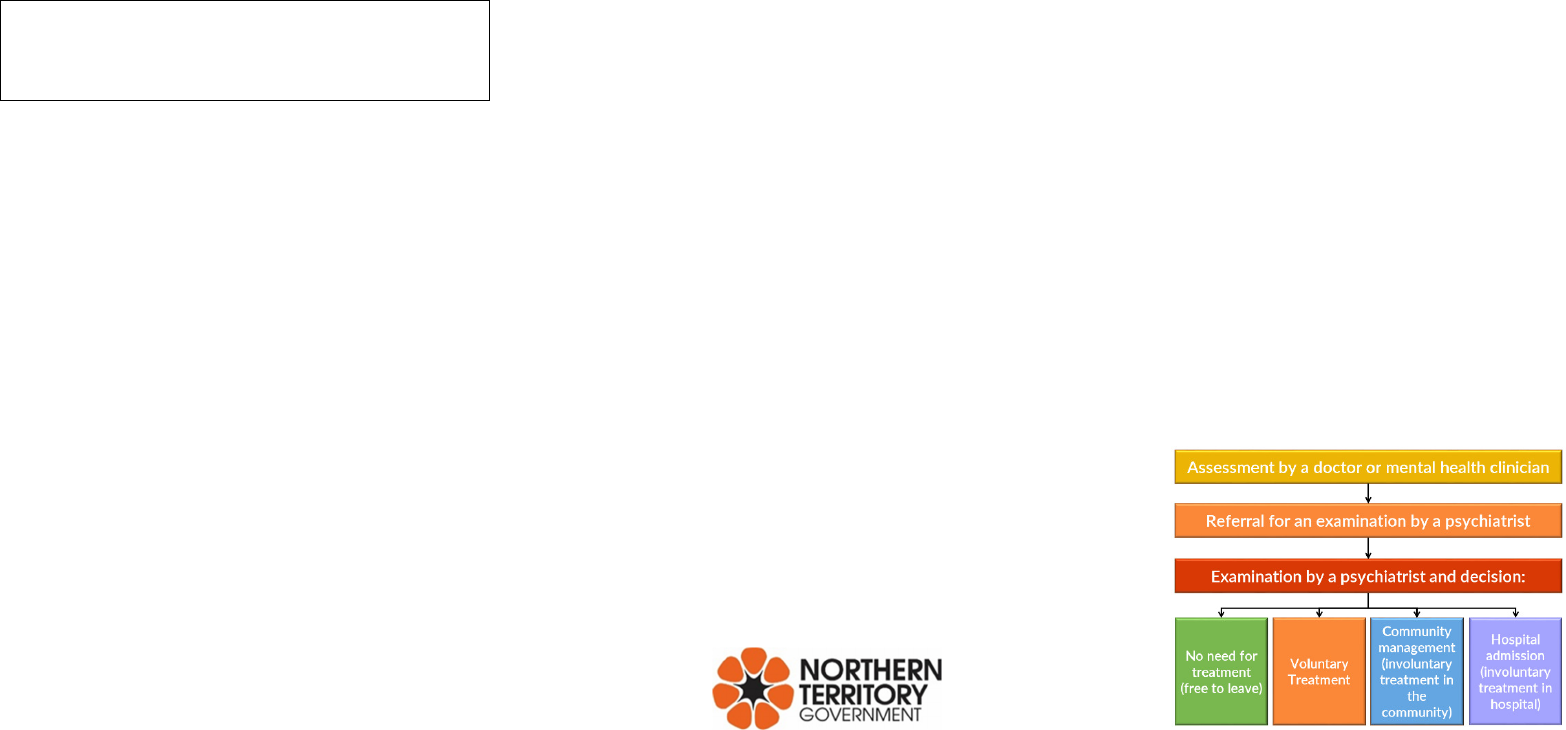
Notification
• Your carer, close family member or other
personal support person will be notified of
the outcome of the examination, unless
the authorised psychiatric practitioner
believes that this is not in your best
interests.
Your rights
• You have the right to:
o be treated with dignity and respect
o be consulted, receive information
about your treatment options and
rights and to have your questions
answered in a format and language
you understand
o be able to contact people including
your carer and a family member
o privacy and confidentiality of your
personal information
o an interpreter
o keep your personal items secure while
you are in hospital
o ask for assistance from a Community
Visitor - this is a free and independent
service
o make a complaint to your hospital, the
NT Ombudsman, or the Health and
Community Services Complaints
Commission (HCSCC).
Further information
The information in this brochure relates to the
laws set out in the Mental Health and Related
Services Act 1998. Information about the Act is
summarised in the following set of brochures:
• Referral to hospital for an examination
(Form 9)
• Voluntary treatment in hospital
• Treatment in the community
• Involuntary treatment in hospital
• Receiving treatment for a mental illness
More information is also available from
https://nt.gov.au/wellbeing/mental-health
Northern Territory Mental Health Access
Line (24hrs, 7 days)
Free call: 1800 682 288
Community Visitor Program
Free call: 1800 021 919
NT Civil and Administrative Tribunal
(NTCAT)
Free Call: 1800 604 622
Health and Community Services Complaints
Commission (HCSCC)
Free Call: 1800 004 474
Referral to hospital
for an examination
(Form 9)
A Form 9 referral is an order under the
Mental Health and Related Services Act
1998 for you to have an examination by an
authorised psychiatric practitioner at the
hospital without your consent.
This brochure provides you with
information about what your rights are and
what you can expect if you are on a Form 9
referral.

What is a Form 9 referral?
• A Form 9 referral is different from an
ordinary referral.
• It is made when a doctor or a highly
qualified mental health clinician has made
an assessment that you may need
treatment at hospital.
• It is an order under the Mental Health and
Related Services Act 1998 for you to have
an examination by an authorised
psychiatric practitioner.
• The referral is valid for 14 days.
An authorised psychiatric practitioner is a
doctor who has been specially trained to
diagnose and treat mental health disorders.
What does the referral mean?
• You have to go to a hospital with a
treatment facility as soon as possible for
an examination.
• There are treatment facilities at:
o Royal Darwin Hospital; and
o Alice Springs Hospital.
• To ensure your safety or the safety of
other people, you may be detained to
make sure that you get to the treatment
facility for the examination.
• Transport to the facility will be arranged.
• Sometimes police or emergency services
might help if there is no other safe
alternative.
• You may be offered treatment such as
medication and you have the choice to
accept or refuse it.
• If you refuse treatment, and it is needed to
save your life or prevent you from hurting
yourself or someone else, then emergency
treatment can be given without your
agreement.
At the treatment facility
• Once you arrive at the treatment facility,
you cannot leave until an authorised
psychiatric practitioner has examined you.
• An authorised psychiatric practitioner will
examine you by talking to you and asking
questions.
• Sometimes the examination may be done
over a video link.
• If you are an Aboriginal or Torres Strait
Islander person, an Aboriginal or Torres
Strait Islander mental health worker might
be there to help to help the authorised
psychiatric practitioner talk with you.
• If you speak a language other than English,
an interpreter may be used to help the
authorised psychiatric practitioner talk with
you.
• At the examination the authorised
psychiatric practitioner will consider:
o if you have a mental illness that needs
treatment; and
o if you are well enough to make a
decision about treatment; and
o if there a risk to you and/or other
people if you do not get treatment; and
o the least restrictive way of providing
you with treatment and ensuring the
safety of you or other people.
What can happen next
The authorised psychiatric practitioner will talk
to you about whether you need to have
treatment.
1. If you do not need to have treatment, you
may leave the facility.
2. If you do need to have treatment, you may
be asked if you agree to have treatment as a
voluntary patient.
3. If you are unwell and refuse treatment, the
authorised psychiatric practitioner may
decide that you need to be an involuntary
patient for your own safety or the safety of
others.
Depending on your illness, you may be
either:
A. Admitted to hospital for treatment.
If you have not already been examined by 2
authorised psychiatric practitioners, you will
have another examination to confirm your
involuntary admission within 24–72 hours
(1–3 days).
B. Placed on a community management order.
You will receive treatment outside of
hospital and will be given the time and place
of your first appointment.
